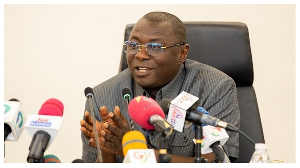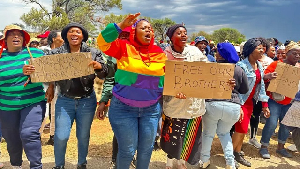[By Y.M. Alex, Ph.D; J.D. Indiana, U.S.A.]
Two biographies are being reviewed: Ghana’s current President John Agyekum (“J.A.”) Kufuor’s [Between Faith and History: A Biography of J.A. Kufuor by Ivor Agyeman-Duah. Oxfordshire: Ayebia Clarke Publishing] and Pakistan’s assassinated President Zulfi Ali Bhutto [Zulfi Bhutto of Pakistan: His Life and Times by Prof.Stanley Wolpert, Oxford University Press]. Ironically, the two Third World leaders staunchly believed in democratic norms and, as a result, came to power through the ballot box as well as the popular voting in their respective countries. Also, they were Oxford-educated lawyers (attorneys). Invariably, they distinguished themselves in their legal profession before being elected in their nations, Ghana and Pakistan, respectively. There is a histo-political coincidence between Lawyers Kufuor and Bhutto, as their biographies have pointed out. For example, President Kufuor earned his initial legal qualification at Lincoln’s Inn in London, but later he entered Exeter College of the University of Oxford in September 1961. The Institution (Exeter College), according to biographer Agyeman-Duah, was established in 1314, and “it is one of the oldest learning institutions in the world” (p.20). The young Bhutto initially entered the University of Southern California (USC). As biographer Prof. Wolpert wrote, “After two years at USC, in June of 1949, Zulfi moved to Berkeley,” (p.31). The future Pakistani leader studied hard to earn first class (summa cum laude) degree from the University of California at Berkeley, before he applied for admission to enter the University of Oxford to study Law at Christ Church College in 1950; later, he was also “enrolled at Lincoln’s Inn, reading for the bar and eating the requite number of dinners there, even as [Mohammed Ali] Jinnaj had done sixty years before,” (p.40). As far back as in 1950, Bhutto had firm intentions to study law at Oxford, just like Kufuor did much later, although he needed an initial guidance. For example, when the young Bhutto first met Christ Church College Counselor Hugh Trevor-Roper (who later became Lord Daker), the counselor asked him what he wanted to study, and Bhutto was quoted as telling the eminent Oxford don: “ I said, I wanted to study jurisprudence and law,” (p.37). Similarly, in a conversation with the late Professor Kofi Abrefa (‘K.A’) Busia (a future Prime Minister of Ghana and Kufuor’s political mentor), he “wished to find out what Kufuor was doing [in London]….Busia continued his inquiry and asked what the young man wanted to do after the [London Bar] examination,” (p.18). “I want to go to Oxford University,” Kufuor told him. The distinguished Ghanaian sociologist and educator took time to explain to the young and impressionistic Kufuor the Oxford system, since he had studied constitutional law(and other subjects) at University College under the then Exeter College rector K.C. Wheare.After promising to provide a reference letter for Kufuor, he was eventually recommended by Dr. Busia to Professor Wheare because Kufuor had pleaded with him in the following words: “ If your professor is still alive and teaching at Oxford, then he would be the one I will want to study under,” (p.19), Consequently, Bhutto and Kufuor, from different geographic areas(i.e. Asia and West Africa, respectively) and of varied generations, embarked on their separate Oxford ambitions. Agyeman-Duah, among other lofty details, wrote: “Kufuor enrolled in Law for the first two terms, and took what was called Law moderation. One had to pass this programme to continue studies at Oxford…” (p.20). Similar to what the young Zulfi Ali Bhutto had done in meeting with then Counselor Trevor-Roper, when the young Kufuor met with Exeter College Law Tutor D.D. Hall for assessment “ to find out if you [Kufuor] are up to the required standard,” (p.18). At the meeting at the Rector’s Lodge, Hall asked the future Ghanaian leader if he could pass the British Bar final examination. “Kufuor replied, ‘Of course I will pass.’ But the conversation did not end. Mr. Hall gave the caveat, “If you pass, you have been admitted. But you must pass, otherwise you cannot come [to Oxford],” (pp.19-20). Kufuor’s Biography.
In January 2007, Professor Wole Soyinka, the first black writer to win the Nobel Prize in Literature, went to the Ghanaian capital, Accra, to launch the 400-page revamped and appreciatively revised volume of Between Faith and History. As the guest speaker, Professor Soyinka was launching the book at a function organized by the Ghana-based public policy think tank, the Centre for Intellectual Renewal and the U.K. –based Ayebia Clarke Publishing ( Ayebia being a former editor of the prestigious Heinemann’s African and Caribbean Writers Series). The launch event was endorsed by the Arts Council of England. Among authors, whose works are being promoted by Ayebia Clarke Publishing include Ama Ata Aidoo; Tsiti Dangaremba (whose 1988 novel, Nervous Conditions, has been blessed with a brilliant introduction by Kwame Anthony Appiah of Princeton University, who is a notable author in his own right), Ken Saro Wiwa (with an introduction by Professor Soyinka). The first edition of Between Faith and History was 136 pages long published by the New Jersey-based Africa World Press. The three-page foreword to the biography (pp.xi-xiii) was by Kenya’s distinguished political scientist and award-winning author, Professor Ali A. Mazrui of the State University of New York (SUNY) at Binghamton, USA. Inter alia, Dr. Mazrui pointed out unequivocally what a good or great biography should do: “ reveals not only the life of its subject but also the times in which the person lived. If the biography is of a politician, the book should encompass insights into the politics of the era. Ivor Agyeman-Duah’s book about President J.A. Kufuor achieves that fusion of narrative between the biography of a man and the history of a country. In writing this, Foreword, I in turn had to strike a balance of my own…” (p.xi). To provide a very fresh appraisal, Agyeman-Duah- a distinguished Ghanaian author and diplomat and author of seven other publications-has added a fresh 6-page preamble to the volume (pp.xv-xx)). The biography is made up of three varied books, but Book One alone has eight chapters, the initial two of which offer readers an incursion into the childhood and growing lineal inheritance, similar to what the British royalty has in stock when Prince Charles one day, by matrilineal prescription, succeeds his mother(Queen Elizabeth II). Chapters Three and Four, which deal with several aspects of Kufuor’s political maturing, mentors and his introduction to partisan politics on a national scale. Infact, it was revealed by the biographer that Kufuor’s relatives (of Apagyafie) donated an early vehicle, a jeep, “to be used for the political campaign by the NLM, later United Party….” (p.10). The author added: “ It was visits to the house by Baffour Osei Akoto and other first generation nationalists leaders, such as J.B. Danquah, William Ofori Atta, Joe Appiah, John Tsiboe, Victor Owusu, Professor Kofi Abrefa Busia, that ignited J.A. Kufuor’s interest in politics. These people were heroes in opposition to Nkrumah,” (pp.10-11). Chapters Five, Six and Eight are part of Book One, in which the eloquent biographer discusses how his subject follows the Footprints of the Fathers; Farewell to the men on Horse-back, where fellow lawyer Joe Appiah was quoted as suing for unity, instead of seeking scapegoats, urging his fellow Ghanaians, “never again [to] buy pigs in pokes but under God, ‘seek the truth, the way and life’ as one people with one destiny,” (p.35). In Book One, readers have been provided with information on unique family details, including the fact that the nine Kufuor siblings of Nana Ama Dappah by 1950, “had moved to Apagyafie [the family home] to live with her [the mother] and their uncles,” (p.6). Quoting from Kwame Anthony Appiah’s excellent 1992 book, In My Father’s House, to illustrate a point, Agyeman-Duah cautioned readers not to assume “that women cannot gain power under patriarch,” (p.6). At this juncture, he paid tribute to the President’s late mother: “The greatest blessing upon the Kufuor children, however, came from their mother, Ama Paa,” (p.6) Book Two takes Chapters Nine, Ten to fourteen… which mainly deals with governance as well as policy issues, including what polemics saw as a baptismal by fire when, reportedly, he went to meet the outgoing Ghanaian President Jerry John Rawlings. Reportedly, the former Air Force Officer and coup-d’etat leader turned an elected President welcomed Mr. Kufuor to “the Castle [presidential seat for governance] and to its problems,” (pp.91-92). That brief welcoming sentiments which is the title of chapter Nine showed how blunt Rawlings could be. In Chapter Thirteen, President Kufuor’s re-election prospects and victory have been detailed in a very useful discussion, which provided readers with an overview of Ghanaian democratic politics. Chapter Fourteen, interestingly, shows how people, who have been given very much, are expected to give a lot, as it has been the situation with Kufuor. Book Three has three chapters of its own, in which the author discusses varied recent (or contemporary topics of which Ghana was considered a part; the topics discussed in Chapter Fifteen, Sixteen, Seventeen included the World Cup, in which Ghana’s Black Stars soccer team excelled; the millennium challenge funds; and economic development). The Epilogue (pp.385-386) and the detailed index of topical names and subjects (pp387-394) provided the book’s readers with several aspects of Ghana’s development and its principal actors; Agyeman-Duah, in earnest, concluded that “sourcing for loans and grants does not come that easy. It takes years for people to change their attitudes; savings at the banks to propel commercial activities; investments in the stocks when a country has had a bad history of amortization; confiscation of bank accounts and disrespect to banking confidentiality by government…..” (p.386). Bhutto’s Biography.
Professor Wolpert’s biography of Prime Minister Bhutto of Pakistan has been divided into sixteen chapters, which discussed his life from the 1928 to 1979, the time that he was hanged for alleged murder, which his supporters considered to be a trumped up charge. Among other useful details, the author pointed out: “No individual in the history of Pakistan achieved greater popular power or suffered ignominious a death as Zulfikir Ali Bhutto (1928-79),” (p.3). The book , in its entirety, fulfills the above-quoted words of the author about the late Prime Minister Zulfi Bhutto, father of former Pakistani Prime Minister Benazir Bhutto, whose own autobiographical account is titled Daughter of The East (1988). In this 333 page book, she lamented the aguish that her father went through at the hands of his own army chief, the late General Zia-ul-Haq, who made sure that Mr. Bhutto, one of the most enlightened leaders the Third World had ever known, was disgraced and eventually hanged. “ Zia ul-Haq, the General who would ruthlessly rule Pakistan for the next nine years….Yet not until yesterday [April 3 1979] had I allowed myself to believe that General Zia would actually assassinate my father,” Benazir Bhutto was quoted by Wolpert as writing. About nine years later, August 17 1988, “ General Zia ul- Haq with most of his top [military] command, and U.S. Ambassador Arnold Raphel and Brigadier General Herbert Wassom, went down to fiery death in a mysterious plane crash shortly after take-off from Bahawalpur Air Base,” (p.329). Many have wondered: Was it in the context of he who kills by the sword dies by the sword? In her 1988 memoirs, Benazir Bhutto asserted briefly: “We believe in God [Allah] and leave justice to him,” (p.265). The 378 page biography of Zulfi Bhutto, its pictorial illustrations, detailed notes and index go a long way to contribute immensely to the political history of Asia in particular and Third World in general. Similar to Agyeman-Duah’s brilliant and beautifully illustrated tome on Kufuor, Prof. Wolpert’s book about Bhutto did detail justice to him and his legacy which his daughter inherited at the age of 26. Conclusion.
Although the lives of Kufuor and Ali Bhutto-covered in the two well written biographies-seemed to have ended divergently, it is still useful to note histo-politically that the two leaders were Oxford –educated lawyers, who became important political leaders through their countries Foreign Affairs Ministries-Kufuor as Deputy Foreign Affairs Minister (1969-72) and Ali Bhutto as boss of the Pakistani Foreign Ministry (1963-1965). Above all, while Kufuor is ending his two-term presidency as the honored guest of Britain’s Queen Elizabeth II at a state visit to London, the colonial citadel (to mark this year’s 50th independence anniversary of Ghana), President Zulfi Ali Bhutto-after many years of working very hard for his beloved Pakistan-was not allowed by a military dictator (Zia), to end his rule of Pakistan in a similar glorious nuance. Indeed, his biographer (Wolpert) very much in great sympathy and in measured pain wrote inter alia: “At 2:00 A.M. on 4 April 1979, Zulfi Ali Bhutto was taken from his death cell to the gallows in Pindi’s dark prison and hanged by the neck until pronounced death,” (p.328). Both books admirably offer their readers important lessons in studying Third World leadership, including the similarities in the lives of these leaders, often regardless of the fact that they studied at educational and professional institutions and also ruled on different occasions. They are books, which provided such useful information that they can adequately serve in classroom and research settings as prescribed textbooks.
*Professor Y.M. Alex is an African-American political scientist and Director of Graduate Studies at Indiana University-Bloomington, U.S.A. This review article was recently published in the African and Asian Studies Journal (Vol 6 2007), Leiden, The Netherlands.
Opinions of Tuesday, 20 October 2009
Columnist: Y.M. Alex & J.D. Indiana


















